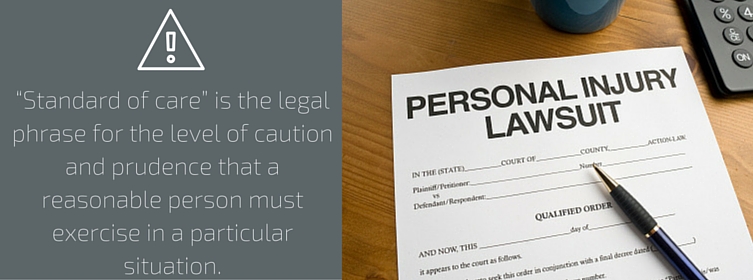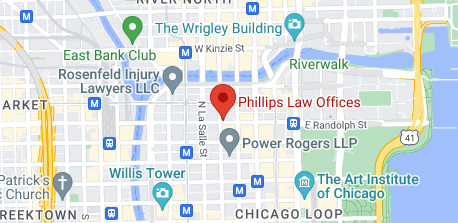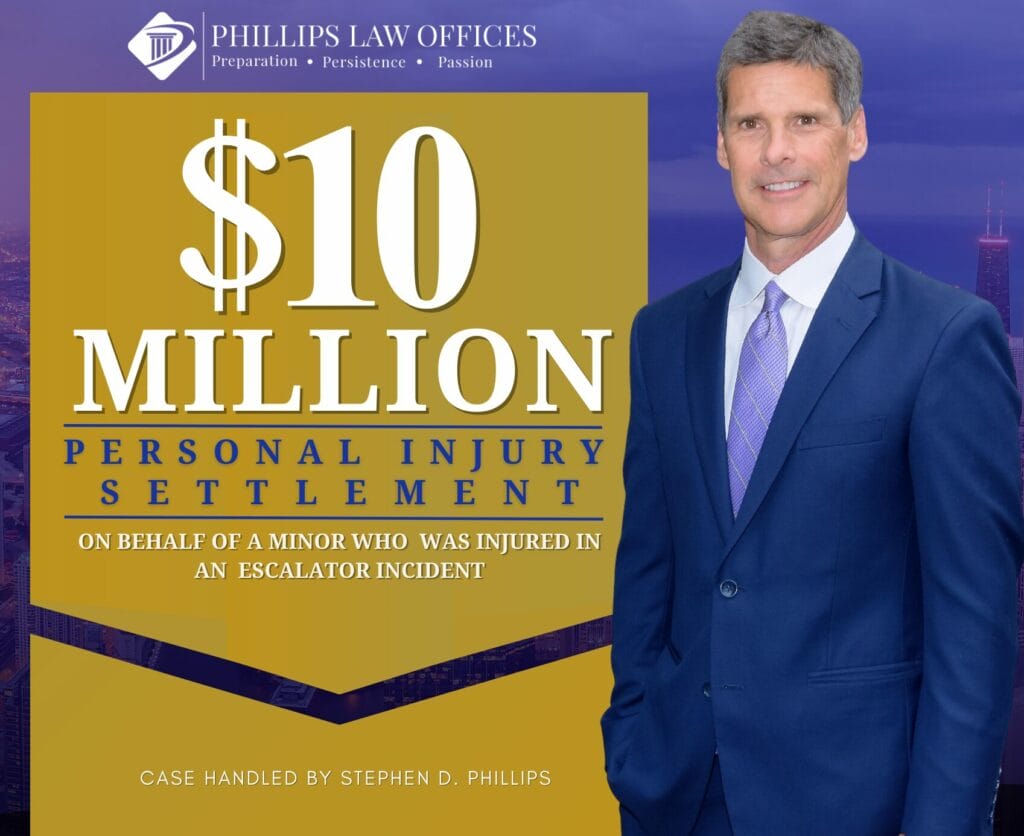If you are a landlord in the state of Illinois – or anywhere else – one of your priorities must be putting solutions in place before problems arise. Real estate laws in most states are complicated, detailed, and sometimes baffling, and residential tenants in most states are provided by law with legal rights and protections to ensure fair treatment. For example, a landlord can sometimes be held legally liable for the personal injuries of tenants.
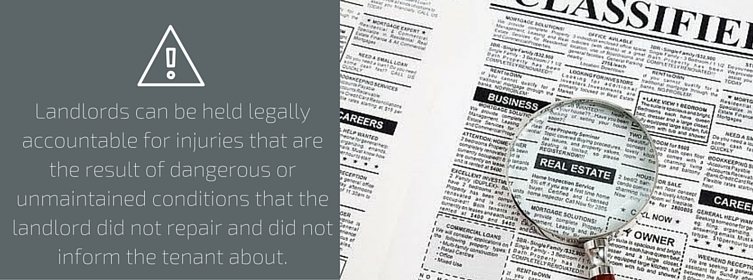
Landlords can be held legally accountable for injuries that are the result of dangerous or unmaintained conditions that the landlord did not repair and did not inform the tenant about. If a tenant reports any dangerous condition – even a dangerous condition that the tenant has caused – a landlord must fix or make a reasonable effort to fix that condition in a reasonable amount of time, or the landlord can and probably will be held liable for any resulting injury or injuries.
If it can be proven that the landlord (or his or her agent) was negligent in maintaining a property, and if it can be proven that the negligence was the proximate or direct cause of an injury or injuries, a landlord may be found liable and compelled to pay damages. In the Chicago area, for example, an injured tenant could file a personal injury claim with the help of a Chicago personal injury attorney against the landlord’s insurance company for medical expenses, lost earnings, pain and another physical suffering, disfigurement, permanent physical disability, and emotional distress.
HOW CAN LANDLORDS PROTECT THEMSELVES?
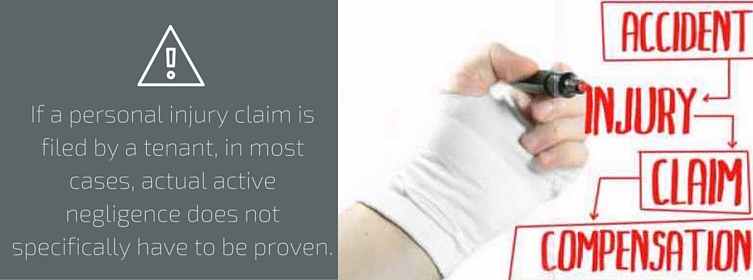
If a personal injury claim is filed by a tenant, in most cases, actual active negligence does not specifically have to be proven. It’s enough for a tenant-plaintiff to show that a landlord simply knew or should have known about a dangerous condition, and either failed to repair it or to give sufficient warning regarding the danger. Landlords must minimize any possibility of injury to tenants, so they may find these three general recommendations useful:
- A rental property must be regularly inspected to ensure compliance with health and safety regulations and to identify any existing or emerging potential hazard.
- Dangerous conditions reported by tenants must be fixed in a reasonable time period.
- Don’t forget to check the lights, water pressure, plumbing and drainage, electrical fixtures, stairs, doors, and windows. Larger properties – apartment buildings and other commercial properties – will be subject to more regulations, and may require regular professional inspections.
Landlords should keep detailed records of the complaints that tenants make and the repairs that are made in response. Rather than brushing off tenant complaints, landlords should actually encourage tenants to report dangerous conditions so that those conditions can be repaired promptly. If someone is injured because of a landlord’s failure to repair a dangerous situation or to provide a clear and adequate warning, the landlord could be found negligent and compelled to pay damages.
Landlords have a legal duty to maintain the general safety of their rental properties. That duty may include the installation and maintenance of extra lights, smoke alarms, fire extinguishers, and in larger buildings it may also include a requirement to post escape plans and instructions in plain view. Illinois law makes landlords responsible for unintentional harm caused by negligence. To prove a claim of negligence against a landlord, a tenant must show that the landlord breached a legal duty owed to the tenant by not meeting the reasonable “standard of care” legally required by the situation, and the tenant must also prove that an injury or injuries resulted from that breach of duty.
Also Read: What Are Possible Symptoms of a Defective Drug?
WHAT IS A STANDARD OF CARE?
“Standard of care” is the legal phrase for the level of caution and prudence that a reasonable person must exercise in a particular situation. If a landlord does not meet the reasonable standard and a tenant is injured, the landlord will be found legally negligent. Precisely what is a landlord’s reasonable standard of care? If a personal injury claim against a landlord goes to trial, the courts will determine what the average, reasonable landlord would do in the same circumstances and whether the landlord being sued exercised at least that minimum level of caution and prudence.
When there’s a law, regulation, or ordinance in place that spells out a landlord’s responsibility, and the landlord is not compliant with that law, regulation, or ordinance, and injury or injuries are the result, the landlord is automatically deemed negligent. For example, if a city or state requires smoke detectors in rental units for residential housing, and injury occurs to a tenant because a residential rental unit was rented without a smoke detector, “reasonableness” is no longer a consideration. Because a law is on the books, a landlord would be considered automatically negligent in that circumstance.
WHEN ARE LANDLORDS LEGALLY RESPONSIBLE FOR INJURIES?
Clearly, not every injury on a landlord’s property is a landlord’s fault. When a tenant is injured on a landlord’s property, inside a unit or in a common area, it doesn’t automatically follow that the landlord is responsible. If tenant’s own negligence or recklessness led to the injury or injuries, the landlord probably cannot be held liable. In fact, landlords are responsible only for injuries caused by their own breaches of duty to provide reasonable care, and moreover, the injuries sustained must be “foreseeable” injuries. In other words, to be found legally responsible for an injury or injuries, a landlord would have to “reasonably” foresee the potential consequences of his or her negligent action (or failure to act).

A landlord may also be held accountable for an injury or injuries caused by the criminal actions of others if those crimes were reasonably foreseeable. For example, if a tenant is injured by a criminal because of a lack of locks, lights, or in some cases the lack of an alarm system, the landlord might be held liable for the injury or injuries, depending on the details of the incident.
ARE YOU ALLOWED TO SAY NO?
As a residential landlord, you cannot refuse to rent to someone based on race, color, religion, age, marital status, sexual preference, gender, national origin, ancestry, a mental or physical handicap, military status, or unfavorable discharge from military service. That doesn’t mean that you can’t say no to a potential renter. You can say no for non-discriminatory reasons including safety reasons. For example, you can refuse to rent to people who smoke or to people who have a criminal record.
Tenants have rights under Illinois law, and if they’re injured by a landlord’s negligence, they have every right to retain the legal help of an experienced Springfield or Chicago personal injury attorney. In addition to making certain – on a regular basis – that rental properties are safe, landlords should protect themselves with strong, and precisely-worded leases that spell out clearly the rights and obligations of both the landlord and the tenant. A precisely-drafted lease, a friendly rapport with tenants, and regular safety inspections are the best tools landlords have for protecting themselves from liability for personal injuries.
Also Read:
Can You Settle Car Accidents Without Insurance?



